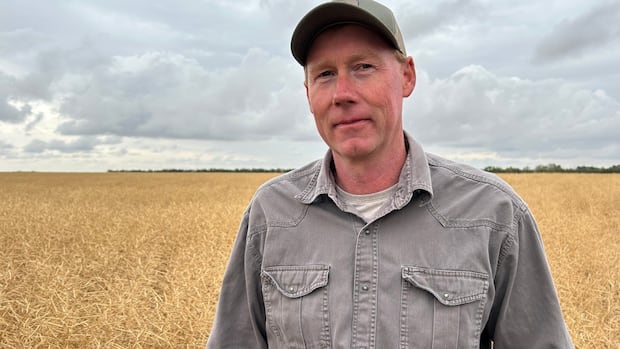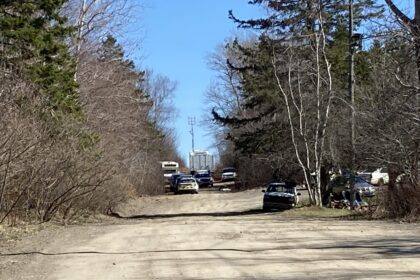SaskatchewanCanola farmers across the Prairies are on track to harvest a strong crop, but fear they might not see a big profit — if any — as tight margins are further squeezed by China’s tariffs.Some Prairie producers say they’re harvesting a strong crop but fear they may not see a big payoutCBC News · Posted: Sep 21, 2025 5:00 AM EDT | Last Updated: 6 hours agoWhen it comes to cash revenue from crops, canola is typically among the most profitable for Canadian farmers, but that profitability may take a hit this year. (Jeff McIntosh/The Canadian Press)Canola farmers across the Prairies are on track to harvest a strong crop, but fear they might not see a big profit — if any — as tight margins are further squeezed by China’s tariffs.”It’s a nice tidy surprise, I think, to see canola production come through as well as it has this year in spite of its challenges,” said Rob Stone, who farms near Davidson, Sask., between Saskatoon and Regina.”Not a gangbuster, but it’s certainly not as disappointing as the crops of [20]21, ’22 or ’23.”However, Stone said the success in the field may not mean much for his pocketbook.When it comes to cash revenue from crops, canola is typically among the most profitable. But that’s taken a big hit this year.China, which slapped a 75.8 per cent duty on Canadian canola seed last month, is Canada’s largest canola seed importer. Canada exported $4.9 billion in canola product to China in 2024, the vast majority of which — $4 billion — was canola seed, according to the Canola Council of Canada.China’s tariff on canola seed, coupled with 100 per cent tariffs on Canadian canola oil and canola meal imposed by China in March, is the cause of much concern among producers across Western Canada. Rob Stone is a canola farmer near Davidson, Sask. This year, tariffs could spell ‘the difference between profit, break-even or maybe a loss,’ he says. (Pratyush Dayal/CBC)Canola prices dropped about $30 to $50 per tonne almost immediately after the Chinese tariffs were announced, said Derek Brewin, an agricultural economist at the University of Manitoba. The lower price means it could cost more to grow canola than producers are able to sell it for.”They’re in a tight situation. The thing that has been paying the bills is barely making any money, and so they might be looking at alternatives in the spring.”Times are tough, said Davidson farmer Stone.”Say a 45-bushel canola crop — if you’re expecting a dollar or two per bushel to be taken over by the tariffs, that means $45 to $90 an acre on our farm, and so that really is the difference between profit, break-even or maybe a loss.”Some relief from feds Earlier this month, Ottawa announced $370 million in new support for Canadian canola producers facing the massive tariffs from China. The incentive is meant to address “immediate competitiveness challenges,” the federal government said.It also increased interest-free loan limits for canola producers to $500,000, but those loans will need to be repaid. The measures are appreciated but fall short, said Rick White, who is president of the Canadian Canola Growers Association. “We just didn’t think it went far enough, and we didn’t think it reflected the gravity of the situation,” he said.”We want to be prepared for the worst and hope for the best, but the announcement is certainly going to help in the short term, so we do appreciate that — but it all depends on how long China has us locked out of their market.”Stone agrees that the government must look to the future.”It doesn’t match up. You’re dealing with a long-term tariff issue with some short-term support,” Stone said. “It’s a program that helps provide some cash flow to our farm, but I have larger concerns about: how do we pay this debt back?”White and Stone are hopeful politicians can negotiate the problem away. “We want the market back. We don’t want support, and if we can get that market back in the short term, then we’re not so worried. But if this thing drags out, farmers are going to need to be supported somehow to get them through this,” White said. Stone understands it’s a complicated problem, but his message for the federal government is simple.”Fix it,” he said.”There’s a lot of things that don’t have a simple fix. And I guess it’s my job, and I guess my opportunity as a farmer, to just say, well, fix it,” said Stone.”It creates a lot of issues for the farm economy, for the Canadian economy and everything in between.”With files from Alexandre Silberman and Amir Said
Thursday, 5 Feb 2026
Canada – The Illusion
Search
Have an existing account?
Sign In
© 2022 Foxiz News Network. Ruby Design Company. All Rights Reserved.
You May also Like
- More News:
- history
- Standing Bear Network
- John Gonzalez
- ᐊᔭᐦᑊ ayahp — It happened
- Creation
- Beneath the Water
- Olympic gold medal
- Jim Thorpe
- type O blood
- the bringer of life
- Raven
- Wás’agi
- NoiseCat
- 'Sugarcane'
- The rivers still sing
- ᑲᓂᐸᐏᐟ ᒪᐢᑿ
- ᐅᑳᐤ okâw — We remember
- ᐊᓂᓈᐯᐃᐧᐣ aninâpêwin — Truth
- This is what it means to be human.
- Nokoma











